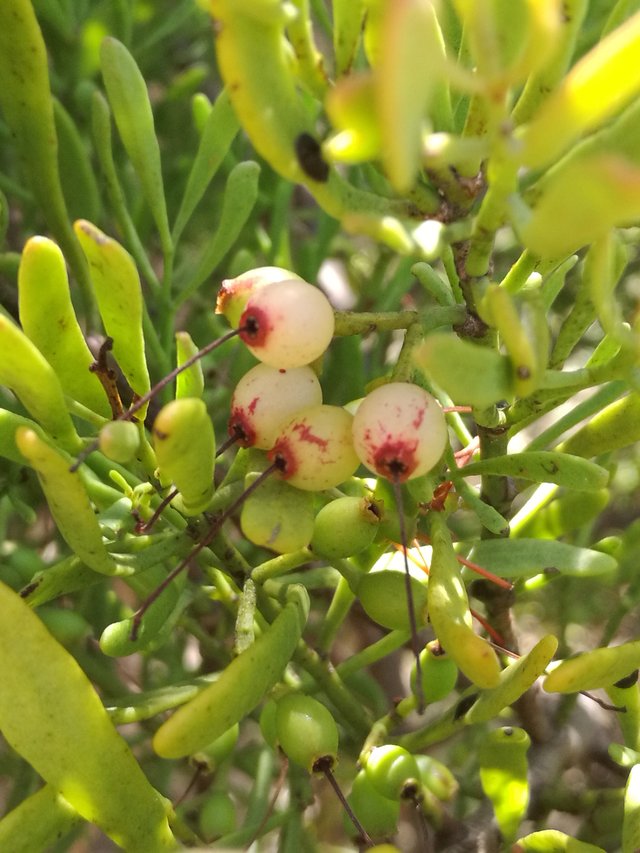
In Australia, Mistletoes are a bushfood because of their delicious berries that tend to be a white or pink/white when ripe. You can eat them green, but white is much, much better. They're a common and interesting group of plants that are worth a closer look...
The berries are full of complex carbohydrates that make them sticky in the mouth, getting stickier the longer you leave them. This leads to the nickname of 'Snottygobble' in some areas (Not to be confused with this Snottygobble) that I've covered before. That slimy stickiness also contributes to Mistleoes' interesting germination habit that is covered later in this post.
Australian Mistletoes are related only by name and general habit to the Mistletoes of European Christmas. We have five species in South Australia alone!
The European Mistletoe Viscum album that we're all familiar with is in the Family Santalaceae while the Australians are Loranthaceae.
Mistletoes are interesting plants, they are parasites on a variety of trees. In Oz, they are spread by the Mistletoe Bird (Dicaeum hirundinaceum) who's specialist habits make it perfect for the job. Mistletoebirds eat mostly Mistletoe berries and when they poop them out, they do so with their bottoms aligned along a branch rather than hanging over the side. This results in the seed being deposited on the branch rather than on the ground. The sticky carbohydrates in the seed glue it to the bark then a specialized root called a 'hypocotyl' penetrates the bark.
Mistletoes are a 'hemiparasite', they are not fully parasitic because they produce their own carbohydrates through photosynthesis. The rest they get from their host plant.
In our area there are two varieties that are found easily. These are Box Mistletoe (Amyema miquelii) and Harlequin Mistletoe (Lysiana exocarpi). These two are have interesting habits. Box Mistletoe only grows on Eucalyptus trees while Harlequin Mistletoe never grows on Eucalypts. However, Harlequin Mistletoes may be a parasite on another Mistletoe that is already growing on a Eucalyptus!
The last picture shows that happening and to confuse the issue and it's difficult to see because it's only small, there is a third Mistletoe, a rare Dropping Mistletoe (Amyema pendulum) on the same tree. I didn't photograph it because I wasn't aware that it was there until I checked the flower and leaf samples that I took home.
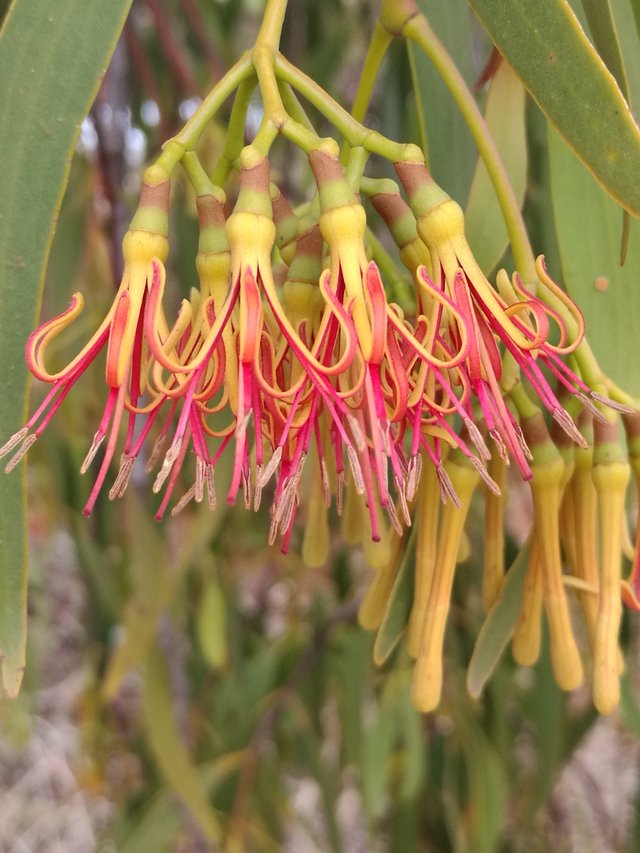
Box Mistletoes have flat, dropping leaves and red flowers in groups of 3 that hang from a group stalk. Each flower has its own stalk and has 5 petals. The flowers hang downwards
They flower and fruit throughout the year.
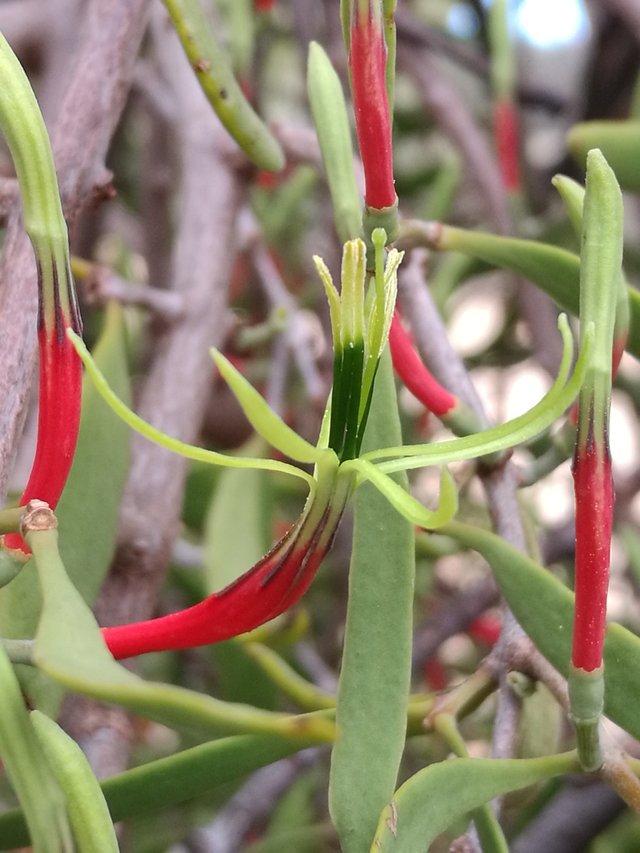
Harlequin Mistletoe has two forms, one with a bright red flower tube and another where it is green or yellow. It's all getting pretty confusing...
The flowers have 6 petals and are held erect.
They flower and fruit throughout the year.
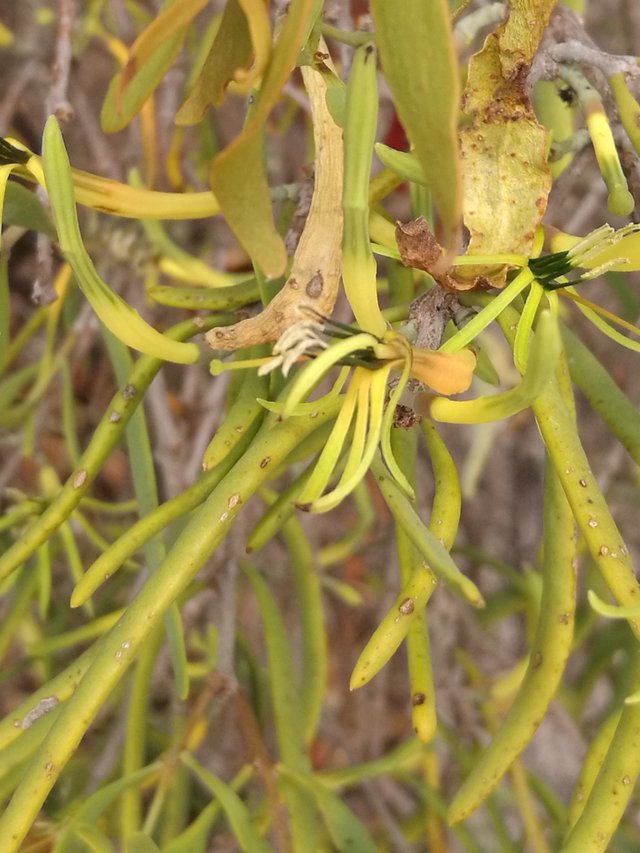
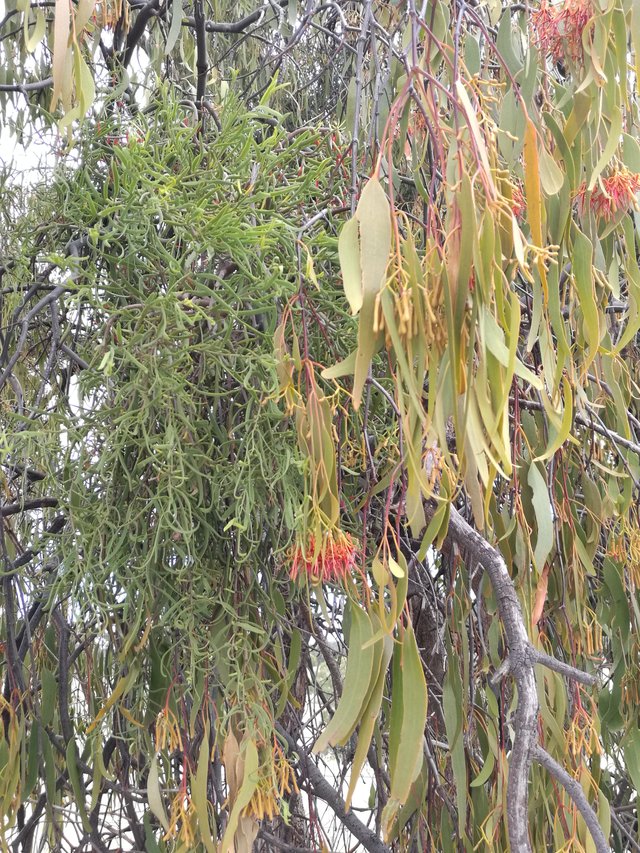
For those interested, I mentioned Dropping Mistletoe (Amyema pendulum) earlier. That species is essentially the same as Box Mistletoe except the center flower in each group of three doesn't have its own stalk.
Like I said, it's an interesting group...you probably won't get a kiss, but you'll get a good feed.

This is @originalwork. The pics were taken by yours truly.
You can find more great Bushfoods and Bush Medicines on our Aussie Bushfoods Index here on Steemit.
Learn more about South Australian Bushfoods and Bush Medicines on our blog, Ligaya.
We also have a YouTube channel and a Patreon page that you might like to visit.
We're also members of the Homesteadersonline community. Click the image for the invite link to join us


Nice flower..
This Flowers and fruit familiar to me.
But is this fruit can be eaten.?
Because here our parents forbid eating this fruit ,,!
Downvoting a post can decrease pending rewards and make it less visible. Common reasons:
Submit
That's a different plant. Where do you live?
Downvoting a post can decrease pending rewards and make it less visible. Common reasons:
Submit
Really,,Look the same right..
I'm Aceh, Indonesian.
Downvoting a post can decrease pending rewards and make it less visible. Common reasons:
Submit
Hello Aceh! They look similar, but if you look closely, the leaves are very different as well as the flowers. Your flowers are in close groups almost joined. The mistletoe is in open clusters.
Downvoting a post can decrease pending rewards and make it less visible. Common reasons:
Submit
yes right ,,
After i zoom the picture i can see the difference, and my interest is a kind of parasite
Thanks for sharing @ligayagardener
Downvoting a post can decrease pending rewards and make it less visible. Common reasons:
Submit
Your Post Has Been Featured on @Resteemable!
Feature any Steemit post using resteemit.com!
How It Works:
1. Take Any Steemit URL
2. Erase
https://3. Type
reGet Featured Instantly � Featured Posts are voted every 2.4hrs
Join the Curation Team Here | Vote Resteemable for Witness
Downvoting a post can decrease pending rewards and make it less visible. Common reasons:
Submit
So the fruits of all the 4 species are edible?
Downvoting a post can decrease pending rewards and make it less visible. Common reasons:
Submit
Ive not eaten the fruit of A. pendulum, but I've eaten the others with no ill effects
Downvoting a post can decrease pending rewards and make it less visible. Common reasons:
Submit
Cool thanks
Downvoting a post can decrease pending rewards and make it less visible. Common reasons:
Submit
Thats an interesting variety, i have often wondered about their edibility. I just wonder if the British variety is similar.
Downvoting a post can decrease pending rewards and make it less visible. Common reasons:
Submit
Im not sure, though it is an old standard in herbal books
Downvoting a post can decrease pending rewards and make it less visible. Common reasons:
Submit
This is a great and thoughtful post on a unique food. Your pics and descriptions are spot on, well done. If I make it to Oz, I’ll be sure to check this out in person.
Downvoting a post can decrease pending rewards and make it less visible. Common reasons:
Submit
You'll be more than welcome in Oz!
Downvoting a post can decrease pending rewards and make it less visible. Common reasons:
Submit